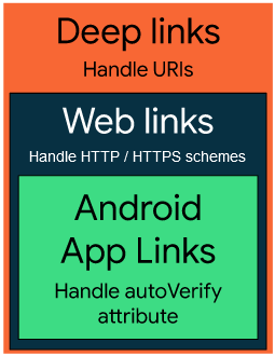Android
This web page might be outdated, please refer to this site for an up-to-date guide on native app passkeys.
The implementation for Flutter Android is still very similar to native Android with Kotlin Flutter, as there is no good Flutter SDK for passkeys / WebAuthn yet.
Origin
The origin needs to bet set to the following scheme android:apk-key-hash:xxx if a passkey / WebAuthn request is sent
to a WebAuthn server from an Android app. The origin in this case is
called FacetID.
Creating the required android:apk-key-hash:xxx can be quite complicated. The Android package_name and debug signing
key of a developer account (it needs to be the SHA-256 hash of it) are required.
Use the following command to generate it:
keytool -list -v -keystore ~/.android/debug.keystore -alias androiddebugkey -storepass android -keypass android
Digital Asset Links (DAL)
To associate a native app with a web app, Android requires an Digital Asset Link
file assetlinks.json. Use the following JSON
template and store it under acme.com/.well-known/assetlinks.json if your domain is acme.com:
[
{
"relation": [
"delegate_permission/common.handle_all_urls",
"delegate_permission/common.get_login_creds"
],
"target": {
"namespace": "android_app",
"package_name": "{PACKAGE-NAME}",
"sha256_cert_fingerprints": [
"{FINGERPRINT-OF-YOUR-SIGNING-KEY}"
]
}
}
]
Variables:
PACKAGE-NAME: The Android package name.FINGERPRINT-OF-YOUR-SIGNING-KEY: The SHA-256 fingerprint obtained before (eg. 7H:AC:4C:...).
Google offers a free tool to test if the setup and hosting works correctly.
The following constraints must hold for the file:
- It must be publicly available, and not behind a VPN.
- It must be served with Content-type: application/json.
- It must be accessible over HTTPS.
- It must be served directly with an HTTP 200 response (no HTTP 300’s redirect).
- Ensure no robots TXT prevents it:
- User-agent: *
- Allow: /.well-known/
For example www.facebook.com/.well-known/assetlinks.json is the file for Facebook.
Binding passkeys to your own domain
If you want to bind the passkeys to your own domain (e.g. acme.com), you need to manually change
the WebAuthn relying party and host the assetlinks.json
file on this domain (so on acme.com/.well-known/assetlinks.json).
Moreover, you need to associate your native app in the assetlinks.json file. Use the following JSON template and host
it under acme.com/.well-known/assetlinks.json:
Android native implementation
It requires a client library, e.g. Fido2ApiClient and a WebAuthn server. A code lab to play around is
available here. The current Corbado Flutter
implementation also uses Android native implementation with the Fido2ApiClient library.
Android WebView implementation
Android WebView doesn’t support passkeys (due to security reasons).
Workaround 1: Third party solution
Only hardware security keys seem to work. There's a third party solution
that builds a workaround by injecting a JavaScript bridge that redirects the navigator.credentials calls to their
FIDO2 implementation.
Workaround 2: Android Custom Tabs
You can Redirect the browser directly to a prepared website or via Android Custom Tab ( see SFSafariViewController for iOS).
Useful sources:
- Stackoverflow: Android WeView Support WebAuthn
- Stackoverflow: Describes in understandable manner how to use passkeys in native Android apps and how WebAuthn / passkeys can be used in conjunction with OAuth
Native app linking
It seems that assetlinks.json does not need to be updated if you intent to create native apps
only (implementation advice).
To link native Android apps to web apps and allow intercepting links or accessing passwords stored in WebView, Android
uses DAL. It is deployed identically on all relevant domains that are used for app
linking (opening email magic links or web links directly in the native app):
subdomain1.acme.com/.well-known/assetlinks.json. For example other subdomains can include also the main
specification using subdomain2.acme.com/.well-known/assetlinks.json.
When the Android app starts, it uses the information in the AndroidManifest.xml to find out which domains might be
linked to the app. More than one domain is possible. They need to be specified like
that: [{"include":"https:\/\/www.acme.com\/.well-known\/assetlinks.json"}]
Example
The Android developer source provides an example:
<application>
<activity android:name=”MainActivity”>
<intent-filter android:autoVerify="true">
<action android:name="android.intent.action.VIEW"/>
<category android:name="android.intent.category.DEFAULT"/>
<category android:name="android.intent.category.BROWSABLE"/>
<data android:scheme="http"/>
<data android:scheme="https"/>
<data android:host="www.example.com"/>
</intent-filter>
</activity>
<activity android:name=”SecondActivity”>
<intent-filter>
<action android:name="android.intent.action.VIEW"/>
<category android:name="android.intent.category.DEFAULT"/>
<category android:name="android.intent.category.BROWSABLE"/>
<data android:scheme="https"/>
<data android:host="www.example.net"/>
</intent-filter>
</activity>
</application>
In this case, the Android app would access https://www.example.com/.well-known/assetlinks.json
and https://www.example.net/.well-known/assetlinks.json to check whether the right specification has been laid out in
the assetlinks.json. For intercepting links in mobile browsers the delegate_permission/common.handle_all_urls would
be needed for namespace web. For intercepting links on any other native app (e.g. Gmail or other third party
apps) android_app is needed.
In general, there are two namespaces web and android_app to access password credentials and/or passkeys
in the web (default browser on Android) and in a native
app (source). The
grant for this is delegate_permission/common.get_login_creds.
Current recommendation for FIDO is to use both:
“The relation will eventually only require delegate_permission/common.get_login_creds in order to share credentials
between websites and apps, however, until we complete migrating our logic to accept it, please include
both delegate_permission/common.handle_all_urls and delegate_permission/common.get_login_creds.”
This will lead to Android App Links being intercepted and opened in the native app (not Deep Links or historic web links, where native apps could just arbitrary register to listen to URLs.
See the overview of different link types:

Deep Links
They allow to work with any scheme without host specification. The only thing is that the scheme must be
unique: your_scheme://any_host or corbado://any_host (comparable
to Custom URL schemes in iOS).
Android App Links
They only work with an https scheme and specified host and
hosted Digital Asset Links file: https://your_host (comparable
to Universal Links in iOS).